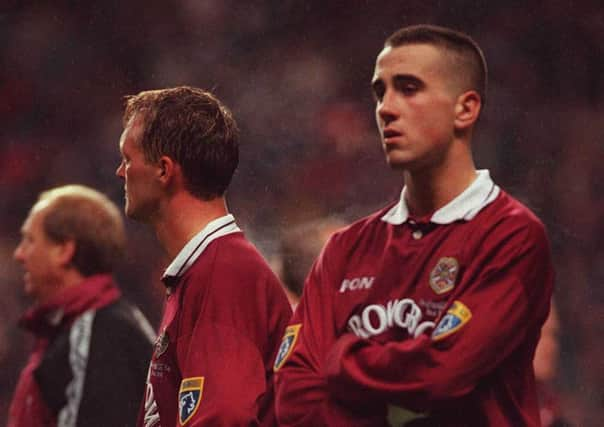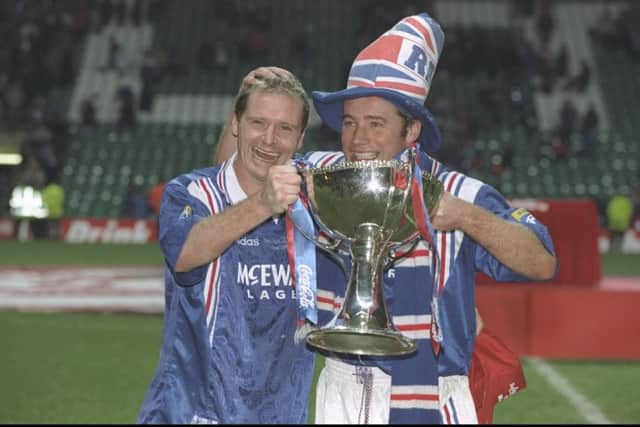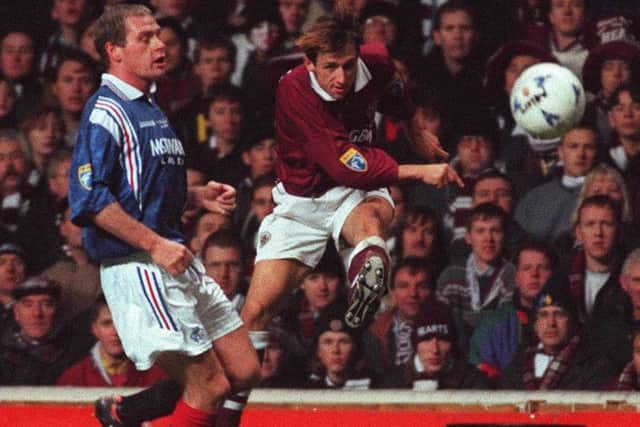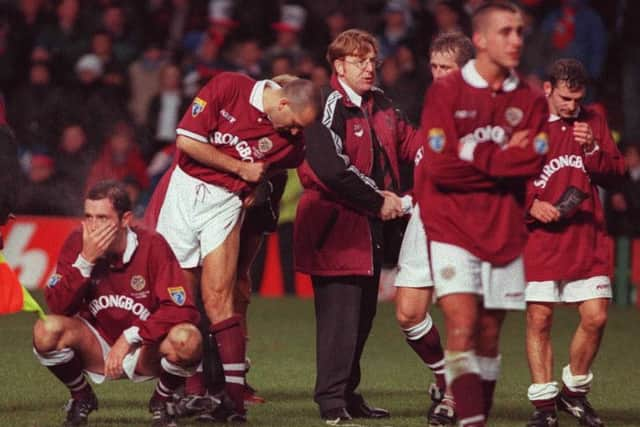Twenty years on: Is this the greatest League Cup final ever?


By 1996, Hearts had failed to win any major honours for 34 years and night terrors had been especially prevalent during years ending in a six. Defeat to Rangers in the 1976 Scottish Cup final was followed by the horror of the ill-fated 1985/86 campaign, in which Hearts surrendered their lead in the league on the final day of the season before losing comfortably in the Scottish Cup final a week later.
The succubus reared her ugly head once more in May of 1996 during another Scottish Cup final defeat at the hands of Rangers. This time their demons dished out an absolute mauling. And while 2006 saw Hearts lift the Scottish Cup for the second time in a decade, it was an anti-climatic final in an anti-climatic season that left supporters yearning for what could have been were it not for the persistent meddling from Asmodeus himself.
Advertisement
Hide AdAdvertisement
Hide AdThere was another moment of anguish in 1996. A performance that left the Tynecastle faithful proud of their side but which still ended, ultimately, in defeat.


Around a year prior to that final, Jim Jefferies took the reins from the deeply unpopular Tommy McLean. Despite the optimism surrounding the appointment, Jefferies could not prevent the club from sliding to the bottom of the league. He set about restructuring his squad and added a commanding goalkeeper in the form of Gilles Rousset along with the classy yet temperamental centre-back Pasquale Bruno.
Colin Cameron, at the time a promising young attacking midfielder from Raith Rovers, was later recruited, as was the experienced left-sided Neil Pointon. The end result was a fourth-placed finish behind Rangers, Celtic and Aberdeen.
There was also a euphoric Scottish Cup semi-final win over Aberdeen that season – sending Hearts to their first final in 10 years and temporarily banishing memories of six semi-final defeats in that time, including two to perennial thorn in their side Airdrieonians.
That set up a cup final showdown against Walter Smith’s Rangers, who were rampant and unrelenting and in the midst of their run of nine consecutive league titles. Hearts lost 5-1 due to an absolute master class from one Brian Laudrup.


“It was a difficult one to take because although they were a better team than us, we weren’t that far behind them and I think it was just one of those days,” Paul Ritchie recently told The Scotsman from his home in California. “Brian was a world-class player and some of the things he could do with the ball, the pace with which he could run with the ball was phenomenal.”
Towards the end of that year, a new season was in full-flow and the first silverware of the season up for grabs. Hearts again found themselves in a final against Rangers. Jim Jefferies’s men hadn’t conceded in three matches going into the Scottish League Cup final, but those were matches not involving Brian Laudrup. Furthermore, Hearts had recently suffered another heavy defeat at the hands of Rangers, albeit in bizarre circumstances, when no fewer than four Hearts players were ordered off the park.
This had an indirect effect on their League Cup campaign. The following midweek they faced Celtic at Tynecastle in the quarter-final and, due to the suspensions, were forced to bring in Andy Thorn on emergency loan from Wimbledon and throw a barely-pubescent Gary Naysmith in at the deep end for his first-team debut. It seemed to galvanise the home side and resulted in a clean sheet and extra-time winner from John Robertson.
Advertisement
Hide AdAdvertisement
Hide AdA semi-final win over Dundee at Easter Road booked Hearts’ place in the final, leading Ken Gallacher of the Herald to wonder if they would fare any better this time around: “Hearts are a stronger outfit than they were last season,” he wrote. “The fact that they are returning to a final after just five months away will help ease the nerves that big occasions always bring. There is less likelihood of some of the players freezing, as a few did at Hampden.”


There was every chance of the Hearts players freezing, however. Quite literally. The 51st staging of the competition took place at Celtic Park due to the on-going reconstruction at the National Stadium and was played on a bitterly cold November afternoon. In fact, the blizzard in the early hours of the day meant that the fixture was not confirmed to go ahead until around an hour before kick-off.
Ritchie, though optimistic, harboured reservations going in so soon after the Scottish Cup final defeat in May: “It did get us down a little bit, but I think the mentality of the younger players there got us through that. I think we still believed in our ability as a squad and as individuals.
“We knew we were starting to get better and that as time went on we were going to be successful. There was still a fear factor, because we knew that on their day that team that Rangers had that day were fantastic. We were a little bit fearful but, at the same time, we had a confidence that the same result that happened the time before wouldn’t happen again.”


Laurup had thrived in his previous Celtic Park appearances, scoring the winner in an Old Firm match just weeks before and netting a brace there in the semi-final thumping of Dunfermline. Jefferies’s blueprint was to start the match with a back four, which effectively became a three, with Davie Weir and Neil Pointon tucking in from full-back. Ritchie’s task was to follow Laudrup’s every movement.
“I was asked to do that a few times and looking back now, looking at the quality player he was, it was a great privilege,” said Ritchie. “There were certain parts of the game I was successful, certain games where I was successful; certain times when I wasn’t.
“It was a very, very difficult job. Sometimes worked out better than others.”
Even though the Danish international had one of his quieter games in a Rangers jersey, one of those unsuccessful moments for Ritchie came during the opener. Laudrup received the ball in midfield from Gascoigne with his back to goal. After a slight feint, his first touch was a backheel that gave him half a yard on Ritchie. Then he was off, driving towards the centre of the Hearts defence. Despite Gary Mackay closing Laudrup down, Bruno vacated his central defensive position, leaving the deadly McCoist free. Laudrup diligently slipped the ball through to the Rangers striker, who slotted beyond the on-rushing Rousset.
Advertisement
Hide AdAdvertisement
Hide AdShortly after, Super Ally doubled his side’s lead following a corner, with Bruno again losing his man. It was McCoist’s 50th League Cup goal, equalling the record set by former Rangers striker Jim Forrest. Earlier in the week he had equalled another record.
His two goals versus Grasshopper Zurich, though his first in the Champions League, had matched the total European goals scored by former Hearts and Celtic maestro Willie Wallace. Hitting the target on the field was rarely a problem for McCoist, though he had trouble after that match when asked to produce a post-match urine sample for a random drugs test. He emerged to face the media two hours after finally overcoming stage fright.


Hearts would have wished he had been similarly as impotent at Celtic Park and must have wondered if this was the start of another bludgeoning. However, a Steve Fulton goal shortly before half-time swung the momentum in their favour. By then, frustration was brewing among the Rangers players and McCoist and Gascoigne were twice involved in lovers’ tiffs.
The fresh impetus meant that Hearts emerged from the break buoyant. Right-back Alec Cleland had been withdrawn at half-time after being terrorised by McCann. The Australian Craig Moore was moved out to the right in his place and was often joined by one or two others in an attempt to contain the little number 7. When left isolated, Moore had no option but tactically obstruct McCann, allowing his side to regroup.
But the man-of-the-match was unstoppable. Not long after Cameron passed up a glorious chance to equalise, McCann sailed past four players before his cross into the area was cut out. Sensing weakness, Hearts began to give the ball to him at every opportunity.
On the 58th minute McCann again received the ball on the left. The biting cold may have been persistent in the swirling wind, but the hot knife McCann cut through it and the double-challenge of Moore and Charlie Miller like butter then aimed a low cross at the centre. Andy Goram pounced but missed, allowing John Robertson to tap in the equaliser and send the Hearts end into raptures.
With the scores level and their opponents seemingly languishing, many in the Hearts support must have felt that their time had finally come. That feeling was not necessarily shared by the Hearts players, though.
“We got back into the game, we were on the ascendancy and you start to think to yourself ‘Is it possible?’ said Ritchie. “I think it’s always in the back of your mind that it’s been so long since Hearts won anything.
Advertisement
Hide AdAdvertisement
Hide Ad“It’s always difficult [to say], especially when you’ve got two teams with the quality forwards that both teams had, because it was that close a game and one mistake or one bit of brilliance was going to win the game.”
A moment of brilliance is exactly what won the game. Two minutes to be exact. The effervescent Paul Gascoigne, like Laudrup, was also having one of his quieter games but burst into action when his side needed it most. He collected the ball in the Hearts half before hurtling towards the centre, shoulders hunched and arms slightly aloft in that unmistakable running-style, before curling a superb effort into the bottom corner.
Around two minutes later he played a delightful one-two with Miller, restoring Rangers’ two-goal advantage. Albums from Pulp and Blur had been nominated for Brit Awards earlier that year. Whether or not those CDs were ever added to Gascoigne’s collection is unclear. Regardless, Gazza was different class in that two minute spell and led Rangers to a great escape.
Gascoigne’s first goal was not without its controversy, however. In the build-up, John Robertson felt he had been fouled by Joachim Björklund, right in front of linesman Alan Freeland. The protests were waved away by referee Hugh Dallas and Hearts were punished for a momentary lapse in concentration. Perhaps if midfield destroyer Stefano Salvatori had not been missing through injury, he may have helped tame Gascoigne’s surging runs, even if it meant taking a cynical booking.
Speaking post-match, Jefferies couldn’t hide his disappointment at the decision: “Until that incident I believed we were going to lift the cup. It definitely turned the game – I thought it was a blatant obstruction by Joachim Björklund. It happened just outside our dugout and the linesman was only a yard away.”
Davie Weir had pulled another goal back late on, making the score more respectable on what was a more than respectable performance, but it wasn’t enough to prevent Rangers from lifting the trophy for the 20th time.
Hearts had been left deflated, again. The bubble around the Tynecastle club had filled and filled with optimism, again, and had been punctured by a devastating event, again.
“Going into the League Cup final at Celtic Park there was a confidence there, but it was a difficult one to take” said Ritchie. “We knew we were starting to get better and that as time went on we were going to be successful. And we proved that a few years later.”
Advertisement
Hide AdAdvertisement
Hide AdQuite. Yet another fantasy of bringing home silverware had turned into living nightmare. The parched lips in preparation for champagne would have to be postponed, the open-top bus to be booked for another time – though it would not be remiss to see this defeat as a stepping-stone to greater things the following season. An entire generation of Hearts supporters would have to endure another 18 months of restless nights before exorcising their demons, dispelling those nightmares and realising their dreams.
Written by Craig Cairns (@craigcairns001)
Highlights of the match can be found here.
Read more at: http://www.scotsman.com/sport/football/teams/celtic/aberdeen-s-james-maddison-has-the-x-factor-to-star-at-hampden-1-4301522
